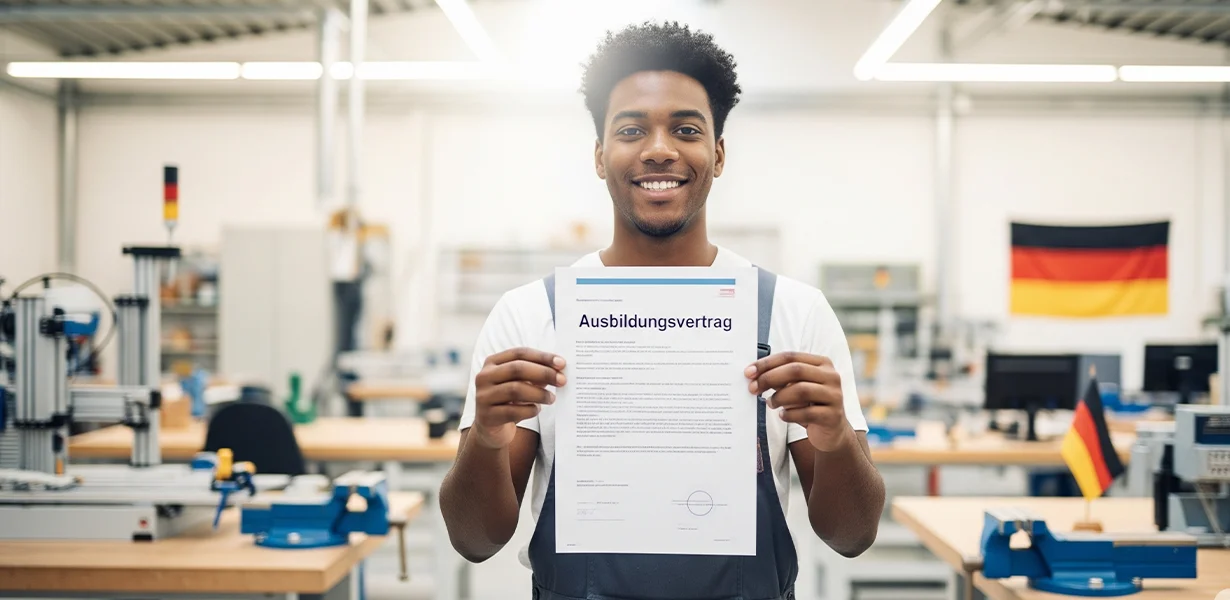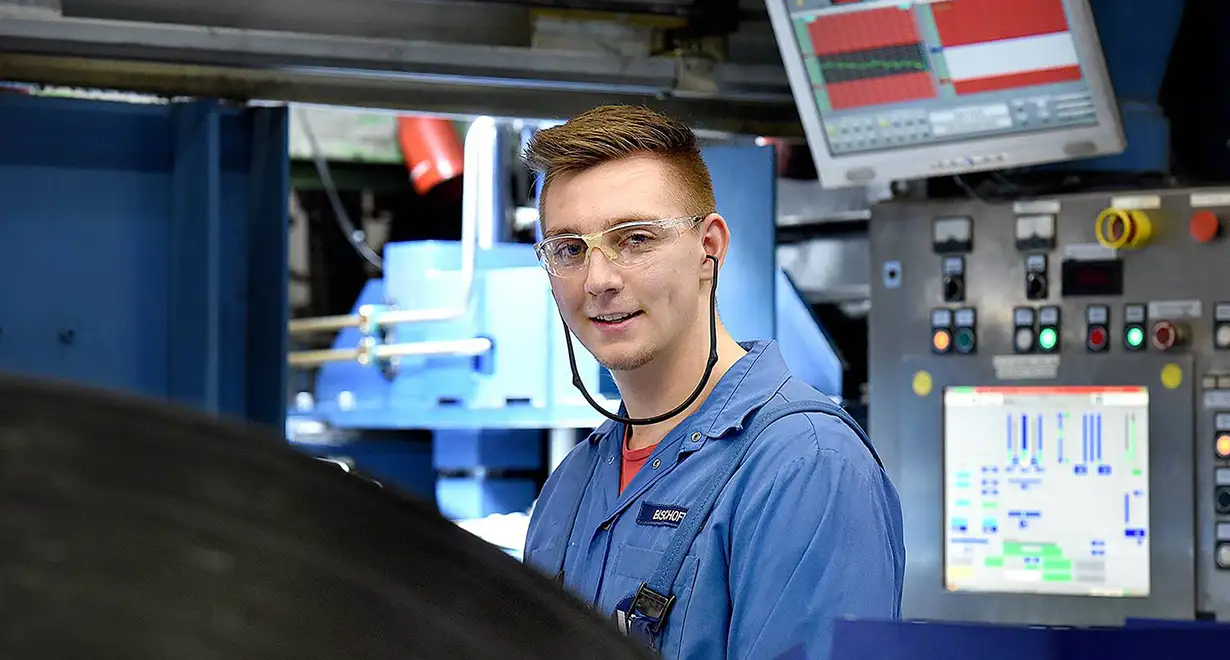German Ausbildung visa
If you’re considering moving to Germany, the Ausbildung program is a golden shortcut—one of the most accessible and rewarding paths to building a life and career here. This innovative vocational training system not only equips you with essential skills but also pays you a regular stipend throughout the course. Best of all, you don’t need a university degree or years of work experience, and for a minimal cost, you can prepare yourself perfectly for the German labor market.
So, if you want to work in Germany but don’t hold a bachelor’s or master’s degree, migrating via the German Ausbildung program is ideal. Remarkably, companies across Germany sign more than 500,000 new apprenticeship contracts each year. Below, we’ve provided a comprehensive overview of this migration Gala Path, read on!
To receive professional immigration consultation, please fill out the form below:
What Is Ausbildung?
Ausbildung is Germany’s dual vocational training program, combining classroom instruction with on‑the‑job experience to teach the skills required for a specific occupation. Trainees receive both theoretical education at a vocational school and practical training at a partnering company. During the program, you earn a monthly stipend—typically €950–€1,200 gross—while you learn. Upon successful completion (usually two to three years), you receive a nationally recognized certificate, qualifying you to work professionally in your chosen field.
Why Ausbildung Is Attractive for International Candidates
- Financial stability during training – Trainees typically earn €800 to €1,300 per month. While this may not seem high, it covers living costs and makes the program accessible without heavy financial burdens.
- Practical experience – Instead of waiting years to enter the job market, trainees gain real-world skills from day one.
- Recognition across Europe – The certificate obtained at the end of Ausbildung is valid throughout the EU, enabling professional mobility.
- Job security – Many companies hire their trainees permanently, minimizing the stress of job hunting after graduation.
Key Requirements at a Glance
- Best age range: 18–30 years
- Minimum education: High school diploma (Abitur or equivalent)
- Language proficiency: German B2 level (CEFR)
- Financial means: Show access to at least €934 per month (via blocked account or sponsor)
- Training period stipend: €950–€1,200 gross per month
Conditions for Ausbildung in Germany
- German Language Proficiency: Certificate at B2 level (e.g., Goethe‑Institut, telc, TestDaF); in some cases, employers may accept B1.
- Educational Qualification: Completion of at least nine years of schooling (secondary‑school diploma or equivalent).
- Training Contract: A formal Ausbildung contract (Ausbildungsvertrag) signed with a German training company.
- Health Insurance: Valid public or private health‑insurance coverage from your arrival through at least the first year of training (or until employer‑provided coverage begins).
- Age Requirement: Minimum 18 years old; no official upper limit, though applicants under 32 often have higher approval chances.
- Proof of Financial Means: Evidence of funds to cover living expenses—approximately €934 per month (for example, via a blocked account).
Age Requirement for Ausbildung in Germany
- You must be at least 18 years old (no formal upper age limit).
- Applicants aged 18–30 are most competitive. In high‑demand professions (e.g. nursing), candidates up to 40 years old often succeed.
- Older applicants face a somewhat higher refusal rate, although the average age of Auszubildende in Germany has been rising.
Proof of Financial Means
You must demonstrate access to at least €934 per month (the standard blocked‑account requirement) to cover living expenses:
- Paid apprenticeship: Submit your signed training contract. If your gross monthly stipend is €934 or more, no further proof is needed; if it’s lower, you must show the shortfall in a blocked account.
- School‑based Ausbildung (no stipend): Open a blocked account with €934 × 12 months.
- Interim support: If you must cover living costs until your stipend begins, either provide bank statements or use the apprenticeship contract as evidence.
- Clients may optionally settle these requirements via property or vehicle barter.
German Language Requirement
German proficiency is mandatory—there are no English‑taught Ausbildung programs.
- You must hold at least a B2 certificate (Goethe‑Institut, telc, TestDaF).
- Some employers may accept B1 for the interview stage, but you must achieve B2 before your training commences.
Educational Qualification
- Minimum: a secondary‑school leaving certificate (e.g., German Realschulabschluss or foreign equivalent).
- Higher qualifications (e.g., university degrees) are also accepted for related vocational programs.
types of Ausbildung in Germany
Duale Ausbildung (Dual Vocational Training)
You split your week between on‑the‑job training at a company (typically three days) and vocational schooling (two days). Most Duale Ausbildung positions pay a monthly training allowance and lead directly into employment.
Schulische Ausbildung (School‑Based Vocational Training)
You attend a vocational school full‑time for theoretical instruction, with practical placements coordinated by the school. In health‑care and social‑care fields, you’ll also complete hands‑on clinical rotations. These programs often do not include a paid stipend, though some schools arrange modest trainee allowances.
Duales Studium (Dual Study Program)
You combine academic study at a university or Fachhochschule (leading to a bachelor’s degree) with paid practical training at a partner company. You earn a salary during your studies and graduate with both an academic qualification and substantial work experience.
Berufsausbildung für Hochschulabsolventen (Vocational Training for University Graduates)
Designed for those who already hold a university degree, these accelerated programs build on your academic background through focused in‑company training and classroom instruction, fast‑tracking you into advanced technical or managerial roles.
Among these, Duale Ausbildung is often the preferred route for many people—because it guarantees both hands‑on learning and a reliable monthly stipend throughout the entire training period.
How long is the Ausbildung in Germany?
Typically, Ausbildung programs run for two to three years, though exact durations vary by program. Some courses conclude in two years, while others—especially Dual Study programs—may take up to three years or more. Exceptional academic performance and relevant prior qualifications can shorten the training period by up to six months, subject to agreement with your employer, vocational school, and the local Chamber of Commerce.
Examples of Ausbildung Programs
- Hospitality
- Metal Technology Specialist
- Building Construction Worker
- Retail Salesperson
- Machinery and Plant Operator
Germany offers apprenticeships in over 330 professions, organized into areas such as:
Economics & Management; Public Administration; Production Engineering; Electrical Trades; Information Technology; Construction Trades; Music & Arts; Textile & Apparel; Laboratory Professions; Media & Communications; Nursing & Healthcare; Service Industries; Food Trades; Hospitality; Agriculture; Environmental Professions; and Architecture.
You split your time between vocational school and on‑the‑job training, finishing with a nationally recognized qualification that significantly enhances your prospects for permanent residency and long‑term employment in Germany.
Costs of Ausbildung in Germany
Tuition: None (dual programs are free)
Monthly stipend: €800–€1,200 (gross), with annual increases—amount depends on employer, region, and your qualifications
Employer benefits: May include subsidized transit passes, meals, or accommodation, depending on company policy
Additional Expenses
- Document issuance fees (for qualifications beyond a diploma)
- Translation and certification of documents (varies by volume)
- Legalization at the visa center (~€38 per document set)
Proof‑of‑funds setup (if apprenticeship stipend is insufficient): recommend €1,000 in a blocked account
Visa application fee: approximately €80
Migration‑agent or legal fees: varies by provider
Note: Ausbildung remains one of the most accessible and cost‑effective Gala Paths to live and work in Germany.

Post‑Training Salaries
Upon successful completion, entry‑level salaries typically range from €2,400 to €3,500 gross per month, depending on your occupation and location. Salaries in Germany rarely fall below €2,000 monthly for qualified professionals.
Migration via Ausbildung
The Ausbildung visa process differs from a standard work visa. Typically, the German embassy issues the Ausbildung visa within 4–8 weeks. Before submitting your training contract, coordinate with the Ausländerbehörde (foreigners’ authority) to obtain preliminary approval. With this pre‑approval in hand, you can fast‑track your visa issuance. If you prefer, our specialist team can manage the entire process for you—just complete the form below.
Registration Period for Ausbildung
German companies often recruit apprentices up to a year before training begins. Start your search at least 12 months in advance to secure the best opportunities.
Steps to Migrate to Germany via Ausbildung
Choose a Profession and Training Company
- Search for apprenticeship openings on ausbildung.de or the official federal Ausbildung portal.
- Tip: Selecting an in‑demand trade (e.g., mechatronics, nursing) can help you secure an embassy appointment more quickly. You may switch programs later in Germany if needed.
Prepare the Prerequisites
- Obtain a German language certificate (B2 level; testing fee ~€50).
- Demonstrate proof of funds (blocked account or employer stipend).
- Secure a training contract with a German company.
- Gather and translate your educational documents (diplomas, transcripts, work references).
- Legalize or apostille your documents as required.
- we can assist with document translation and employer matching.
Submit Your Application to the Company
Send a professional German‑language application including:
- A concise CV
- A motivation letter explaining your choice of trade, school, and employer
- Certified translations of your certificates and diplomas
After an interview, once the company issues your Ausbildung contract, you’ve passed the crucial first stage.
Obtain ZAV Approval
Your employer applies for a Vorranprüfung (pre‑approval) from the Federal Employment Agency’s ZAV unit. This confirms that no local candidate can fill your position.
Academic Recognition (if required)
If your employer requests it, secure a formal equivalency (“Anerkennung”) of your foreign qualifications—using the Anabin database for university degrees or via ZAB for school diplomas—according to your federal state’s regulations.
Visa‑Center Document Verification
Schedule an appointment at the visa‑application center (e.g., Visametric). Bring two sets of all original documents and translations, pay the verification fee (standard or VIP), and receive your entry visa. Correct, complete paperwork is essential to avoid delays.
Arrive in Germany and Register Your Residence
Within two weeks of arrival, register your address at the local Einwohnermeldeamt and complete any remaining formalities. can handle these steps to minimize refusal or delay.
Documents Required for the Ausbildung Visa
When applying from abroad, submit to the German embassy or consulate:
- Signed Ausbildung contract with your employer
- ZAV pre‑approval (if requested)
- Proof of sufficient funds (blocked account or contract)
- Proof of health insurance coverage
- Visa‑application fee payment receipt
- Two biometric passport photos
Note: Ausbildung programs generally start in September or October; apply well before then.
Post‑Training Work Permit and Permanent Residency
After completing your apprenticeship, all non‑EU nationals may extend their residence permit for 12 months to find suitable employment. Once employed for two years, you become eligible to apply for permanent residency. After five years of continuous, legally supported residence—demonstrating stable income and German proficiency—you can obtain an EU long‑term residence permit in Germany.
Top Ausbildung Professions in Germany
Average monthly salaries after completing Ausbildung (gross):
- Dental Health Specialist: €3,300
- Real Estate Agent: €3,000
- Nurse: €2,900
- Truck Driver: €2,500
- Air Traffic Controller: €6,000–€8,000
- Aircraft Mechanic: €3,100
- Bank Clerk: €2,700
- Police Officer: €3,300
- Ship Mechanic: €2,700
- Elderly Care Nurse: €2,640
- IT Specialist: €2,400
Conclusion
The Ausbildung (vocational training) visa offers a straightforward, cost-effective Gala Path to live and work in Germany and ultimately secure permanent residency. By completing an apprenticeship at a German company, you gain in-demand skills, earn a guaranteed stipend, and unlock a clear route to long-term settlement. Every essential step has been detailed to make your Ausbildung journey seamless and successful.
Related Service
- Europe
Job Offer and Ausbildung (Visa)
- Amount: €3,000 (Normal Price)
- Process Time: Approximately 12 months
- Payment Terms: 50% at employer interview (€1,500), 50% upon visa receipt (€1,500).



